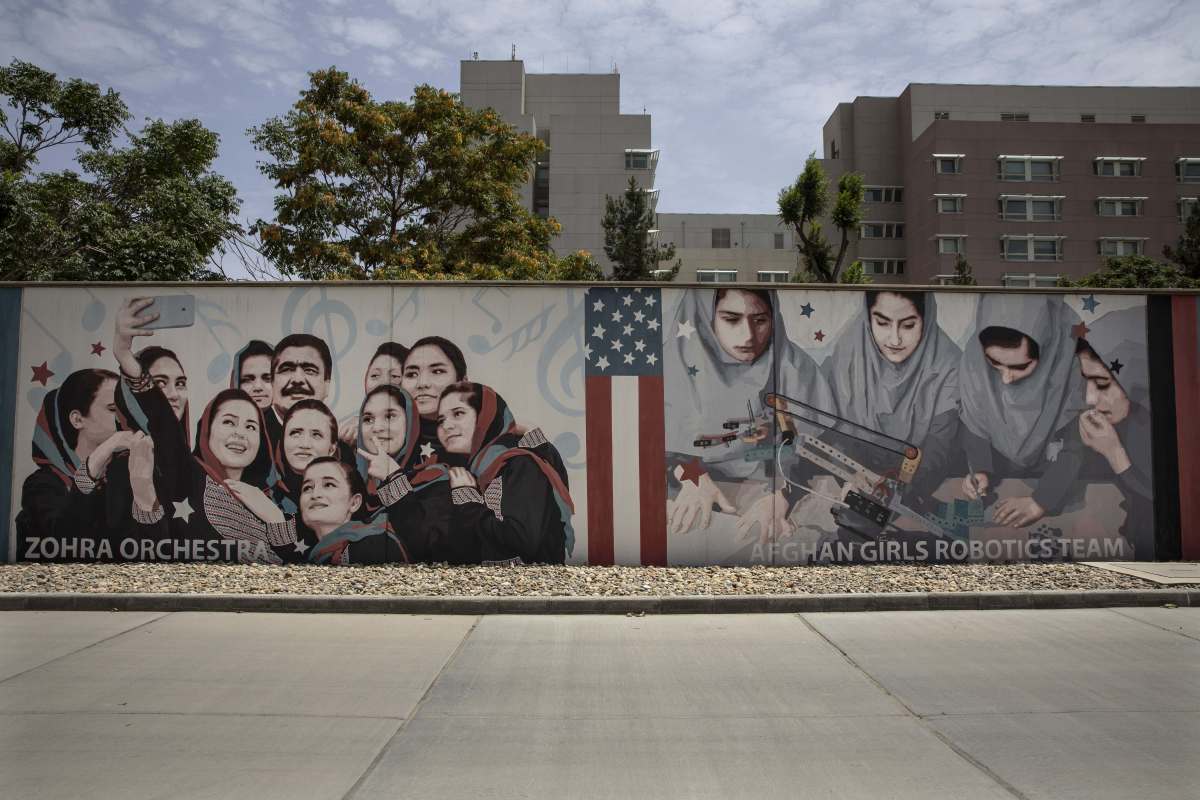Who are ArtLords? Taliban paints over beautiful murals on US embassy walls in Kabul

The Taliban has reportedly painted its flag on a wall outside the US embassy in Kabul. Journalist Emma Graham-Harrison tweeted a photo of the same on Monday, September 6. She wrote, “Entrance to the (former?) US embassy in Kabul today. Murals freshly painted over with a giant Taliban flag.”
Entrance to the (former?) US embassy in Kabul today
— Emma Graham-Harrison (@_EmmaGH) September 6, 2021
Murals freshly painted over with a giant Taliban flag pic.twitter.com/ASE4I0zvoG
Fox News reported a different image showing the Taliban's flag painted outside the former embassy. The flag was reportedly painted in the last few days. When the US government officially pulled its military presence from Afghanistan last month, it left behind the sprawling 15-acre complex of more than a dozen buildings and annexes, built at an estimated construction cost of $806 million.
RELATED ARTICLES
Who trained Taliban pilots? Thanks to US, it now has airforce larger than TEN NATO nations
Taliban using porn sites to 'witch hunt', gang-rape and kill prostitutes
This is not the first time the United States has packed up and left an embassy behind. In Somalia in 1991, escalating tensions led to the evacuation of the US embassy in Mogadishu. Violence also led to the evacuation of the US embassy in Tripoli, Libya, in 2014. And most famously, officials evacuated the embassy in Saigon, Vietnam, in 1975. Last month, it was reported that a memo showed how American diplomats at the US Embassy in Kabul were instructed to destroy important papers and desktop computers before they leave, according to the document.
Before it was repainted, the embassy walls were adorned with beautiful murals. One of them featured the Zohra Orchestra, Afghanistan’s first all-female orchestra. The other featured members of the Afghan Girls Robotics Team, which first made headlines in 2017 when it came to Washington for an international competition. Most members of the team were born after the Taliban were ousted from power in 2001.
The murals were created by a non-profit group ArtLords. Kabir Mokamel’s organization made its first move into the streets of Kabul in 2014. The group began painting the blast walls, to make a political point — post-2001, thick grey concrete walls had come up to shield government buildings embassies, and private residences for the wealthy, turning the city into a fortress. The group chose to paint the country’s politics on the wall. “We want to turn public opinion into murals, that’s why we paint what we hear on the streets,” explained Abrar Kakarr, ArtLords’ program manager. “We don’t want to offend, we want to criticize.”

They have since created more than 2,200 murals across the country. “We’re painting against corruption, we’re painting against the injustices that are happening in society, for women’s rights,” said the group’s co-founder, Omaid Sharifi in 2018. “We’re encouraging people to come and join us, let’s raise our voices against all this nonsense.”
The artists, however, are defiant. A report in Dawn said, that within weeks of taking the capital, many of the street art pieces have been painted over, replaced by drab propaganda slogans by the Taliban. “The image that comes to my mind is (the Taliban) putting a 'kaffan' over the city,” he said on Monday, September 6. “We will never stay silent. We will make sure the world hears us. We will make sure that the Taliban are shamed every single day.”
“It's a very difficult choice (to leave), and I just hope nobody ever experiences what we went through,” he said. “Afghanistan is my home, it's my identity... I cannot take out all my roots and plant myself in another part of the world.”
“The scary part was that I will not have a voice,” he further said. “What really forced me was that I want my voice... I want my freedom of expression.” Sharifi also said that he was able to help 54 artists escape with their families, but more than 100 are still in the country. “All of them are in hiding, all of them are fearful... They're just trying to find a way to get out of Afghanistan… I left (everything) behind. The only thing that keeps me going is that I think this is not the end.”










